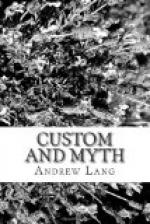Mr. Max Muller says, were incapable of conceiving
the meaning of such a concept. Again, it is
wrongly applied, because it has some modern religious
associations, which are covertly and fallaciously
introduced to explain the supposed emotions of early
men. Thus, Mr. Muller says (p. 177)—he
is giving his account of the material things that
awoke the religious faculty—’the mere
sight of the torrent or the stream would have been
enough to call forth in the hearts of the early dwellers
on the earth . . . a feeling that they were surrounded
on all sides by powers invisible, infinite, or divine.’
Here, if I understand Mr. Muller, ‘infinite’
is used in our modern sense. The question is,
How did men ever come to believe in powers infinite,
invisible, divine? If Mr. Muller’s words
mean anything, they mean that a dormant feeling that
there were such existences lay in the breast of man,
and was wakened into active and conscious life, by
the sight of a torrent or a stream. How, to
use Mr. Muller’s own manner, did these people,
when they saw a stream, have mentally, at the same
time, ’a feeling of infinite powers?’
If this is not the expression of a theory of ’innate
religion’ (a theory which Mr. Muller disclaims),
it is capable of being mistaken for that doctrine
by even a careful reader. The feeling of ‘powers
infinite, invisible, divine,’ must be
in the heart, or the mere sight of a river could not
call it forth. How did the feeling get into
the heart? That is the question. The ordinary
anthropologist distinguishes a multitude of causes,
a variety of processes, which shade into each other
and gradually produce the belief in powers invisible,
infinite, and divine. What tribe is unacquainted
with dreams, visions, magic, the apparitions of the
dead? Add to these the slow action of thought,
the conjectural inferences, the guesses of crude metaphysics,
the theories of isolated men of religious and speculative
genius. By all these and other forces manifold,
that emotion of awe in presence of the hills, the
stars, the sea, is developed. Mr. Max Muller
cuts the matter shorter. The early inhabitants
of earth saw a river, and the ’mere sight’
of the torrent called forth the feelings which (to
us) seem to demand ages of the operation of causes
disregarded by Mr. Muller in his account of the origin
of Indian religion.
The mainspring of Mr. Muller’s doctrine is his theory about ’apprehending the infinite.’ Early religion, or at least that of India, was, in his view, the extension of an idea of Vastness, a disinterested emotion of awe. {233a} Elsewhere, we think, early religion has been a development of ideas of Force, an interested search, not for something wide and far and hard to conceive, but for something practically strong for good and evil. Mr. Muller (taking no count in this place of fetiches, ghosts, dreams and magic) explains that the sense of ‘wonderment’ was wakened by objects only semi-tangible, trees,




